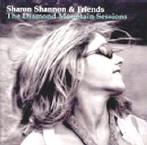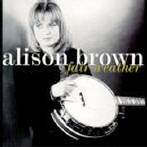 Sharon
Shannon & Friends
Sharon
Shannon & Friends
The Diamond Mountain Session
53:13
There is little doubt that good musicians draw other good musicians into collaborations. Certainly, as seen on the recent Ken Burns epic "Jazz" documentary, exceptional performers, time and time again, seek out other musicians of like caliber to jam and record. Likewise great blues performers encourage similar musicians into jam sessions; in fact the genre has a long history of such collaborations. So does the pattern appear in contemporary Irish music.
Steve Earle, John Prine, Jackson Brown, and Carlo Nunez, to name-drop a few extraordinary songwriters and singers, all have gladly added their talents to Sharon Shannon’s latest recording: The Diamond Mountain Sessions. Besides Shannon’s stunning button-accordion work, her group, The Woodchoppers, features her sister Mary Shannon on mandolin, sisters Yvonne and Liz Kane on fiddles, Jim Murray on guitar and Tony Molloy on bass. Although this instrumentation is quite traditional, Shannon’s virtuoso playing style, her song selection, and her catholic view of music (that is the broad musical influences she selects from around the world) give her music a cosmopolitanism unheard in much of today’s Irish music. Adding a host of top-notch musical friends makes for a very special recording.
On the opening cut—"A Costa de Galicia"—Carlo Nunez’s whistle and Shannon’s sophisticated accordion-work banter rhythmically and harmonically over a fast-paced jig with a whirling fandango. The song lets loose a breath-taking appeal found only in the Gaelic Isles. Likewise on Shannon’s covers of Steve Earle’s "Galway Girl" (in which Earle sings), the raucous, "mountain-music" feel of Earle’s rendition is vastly improved by the strong yet subdued Irish lilt delivered by Shannon. Without a doubt, Shannon’s version is more powerful, convincing and stronger than Earle’s original.
Perhaps there is no better song for hearing Shannon’s music amalgam than the instrumental "The Diamond Mountain." Mixing her vibrato-laced accordion with Richie Buckley’s wailing and soulful saxophone, this masterpiece easily crosses all oceans. Likewise does the Caribbean-influenced "Slan Le Van," a tune saluting the music and influence of fellow Irish artist Van Morrison. Shannon’s worldly view of music is also demonstrated on her impeccable rendition of John Prine’s tune, "Love, Love, Love" (sung by Prine).
Does all this music variegation suggest Shannon cannot handle more traditional Irish music? No … "The Pernod Waltz" is about as perfect an Irish waltz as there is, and "The Hounds of Letterfrack" combines parts of Irish jigs and reels as best one might. But the traditional reel "Northern Lights," which features six fiddlers and guitarist, is otherworldly. Its precision and feel transcends Ireland. For this cut alone one should buy this recording!
For any of you not convinced of Sharon Shannon’s ability and talent, note that she will be appearing at the Ark this March. Don’t miss her!
 Alison
Brown
Alison
Brown
Fair Weather
41:03
And the winner for this years Best Country Instrumental Performance goes to Alison Brown and Bela Fleck for "Leaving Cottondale."
This tune is only one of twelve cuts on Alison Brown’s most recent recording "Fair Weather," and any one of them could have won. Featuring bluegrass stalwarts such as mandolinist Sam Bush; Stuart Duncan, fiddle; David Grier, guitar, and special guests such as Vince Gill, guitarist Tony Rice, dobroist Jerry Douglas, and of course banjo whiz Bela Fleck (who will be at Hill Auditorium in March), this recording should have been the Grammy winner for the Best bluegrass recording of the year. (Instead, Dolly Pardon (?) won.) Brown’s material is strong, the production is first-rate—sharp and clear—and the musicianship is outstanding.
For those of you who haven’t heard of Alison Brown, she was long the banjo-player for Alison Krauss’ Union Station. Taking a nod from Bela Fleck, Brown moved out into the solo field, and like Fleck, her music pushes the traditional realm of the banjo. Gone are the picking and grinning days of the banjoist. Today one has to be adventuresome, incorporating new musical ideas while not being afraid to use pop elements in one’s repertoire. Brown certainly is at this cutting edge.
Besides the award-winning "Leaving Cottondale" (Fleck and Brown’s twin-banjo counterpoint is simply jaw-dropping), three cuts clearly show Brown’s musical breadth: Elvis Costello’s "Everyday I Write the Book, " the beautiful "Everybody’s Talkin’" and her own "The Devil Went Down to Berkeley." The supple accompaniment of "Book" allows the poignant lyrics to shine, moving the song from a mere pop standard into the realm of classic. Similarly, Brown’s soft yet firm finger-picking technique supporting "Talkin’" gives that song added sophistication and dimension. The aggressive prominence of Brown’s playing on "Berkeley," coupled with the soaring fiddle of Daroll Anger, moves this bluegrass-flavor tune into the experimental stratosphere. Whew is all one can say!
But Brown can still play bluegrass. Her "Girls’ Breakdown" is long in tradition as is the pleasant "Deep Gap." Each emphasizes melody and rhythm so important to great bluegrass music.
Brown’s recording is a sure thing. There are tunes that make you hum, others that make you linger, and still others that will stop you in your tracks. With such qualities Brown’s "Fair Weather" truly is a winner!
Signed Elements ©
Individual Authors
Unsigned Elements © Agenda Publications, LLC
